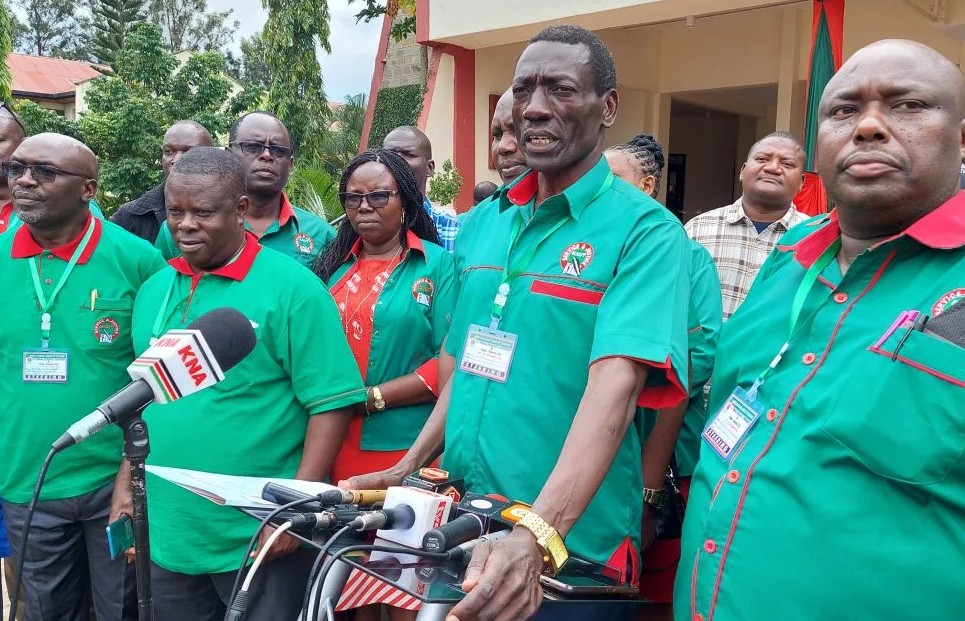Teachers in six North Rift counties threaten strike over healthcare disruption

The standoff stems from new restrictions imposed by their insurance provider, Minet, which has significantly reduced the number of healthcare facilities available to them in the region.
Teachers in six North Rift counties vowed to down their tools on Wednesday, February 5, 2025, in protest against a healthcare access crisis that has left many unable to receive treatment at their preferred facilities.
The standoff stems from new restrictions imposed by their insurance provider, Minet, which has significantly reduced the number of healthcare facilities available to them in the region.
More To Read
- Senators demand urgent probe into delayed teachers’ allowances
- KUPPET threatens nationwide strike if CBA talks fail to kick off in seven days
- Teachers to receive non-pensionable allowances under new TSC reforms
- Teachers in hardship areas accuse Kuppet of neglect, demand increase in hardship allowance
- TSC says it needs Sh3 billion to promote over 178,000 stagnated teachers
- From classrooms to the streets: Inside a tough and turbulent year for Kenyan teachers
The educators, represented by the Kenya National Union of Teachers (KNUT) and the Kenya Union of Post-Primary Education Teachers (KUPPET), issued a 24-hour ultimatum to Minet and the Teachers Service Commission (TSC) to reinstate services at Reale Hospital, Life Care Hospital, and Top Hill Hospital in Eldoret.
The union officials have decried the withdrawal of medical services, saying it had placed teachers in a dire situation.
KNUT Chepkoilel branch Executive Secretary Sammy Bor condemned the suspension, arguing that it put the lives of teachers, especially those with chronic illnesses, at risk.
“We are giving Minet 24 hours to reinstate services at Reale, Life Care, and Top Hill hospitals. Suspending medical services for our members is an insult to teachers in this country. Our members’ contributions are deducted, and they deserve to receive the medical care they require. This situation cannot continue,” Bor said.
KUPPET Elgeyo Marakwet official Paul Biwot criticised Minet for limiting teachers to a single medical facility in Eldoret, warning that this would lead to overcrowding and inadequate healthcare services.
“We have instructed our members that if the commission does not lift the suspension, no teacher will attend class starting Wednesday, February 5. We cannot allow teachers to be forced to rely on a single facility. This situation will worsen their well-being, as it results in overcrowding in one small area,” Biwot said.
The crisis has highlighted deeper issues within the teachers’ medical insurance scheme, with educators claiming that some of the facilities they have been redirected to lack adequate equipment and fail to meet Level 4 and Level 5 hospital standards.
Struggling to get treatment
Uasin Gishu Woman Representative Rose Cheboi expressed concern that teachers with chronic conditions such as diabetes were struggling to access treatment.
“We have teachers suffering from diabetes and other chronic illnesses who can’t access their regular doctors because of arbitrary directives from our insurer,” Cheboi said.
“The government provided this insurance to cater to our needs, but the monopolistic approach being implemented by Makilu and Minet is something we categorically reject.”
Minet Regional General Manager Edwin Kegode attempted to downplay the situation, stating that only six hospitals had withdrawn their services out of a network of 800 healthcare providers.
“We are actively engaging with these facilities to resolve the matter promptly. In the meantime, we have communicated alternative facilities to our members to ensure continuity of care,” Kegode told Nation.
However, teachers dismissed the assurances, arguing that the affected hospitals serve thousands of educators, and the alternative facilities are already overstretched.
“It’s not about the number of facilities available on paper,” a KUPPET representative in the North Rift said.
“These six facilities include major hospitals that have been serving thousands of teachers. The alternative facilities are already overwhelmed, leading to long waiting times and compromised care quality.”
The crisis stems from unpaid claims linked to a Sh29 billion contract between the National Treasury and Minet Administrative Kenya Limited (MAKL).
The payment delays have affected both public and private hospitals contracted to provide healthcare services to over 452,000 teachers, as well as police officers and prison wardens.
Hospitals begun turning away affected patients, with Brian Lishenga, Chairman of the Rural and Urban Private Hospitals Association (RUPHA), confirming that some facilities have issued official notices suspending services.
“What is happening is that individual private hospitals are presenting official letters declaring they have suspended services,” Lishenga said.
“The private insurers who sort out police and teachers have not kept their end of the deal on payments to the private hospitals.”
The disruptions have affected both routine and referral services, including outpatient treatment and hospital admissions, leaving thousands of teachers in limbo as they await a resolution to the standoff.
Top Stories Today











































